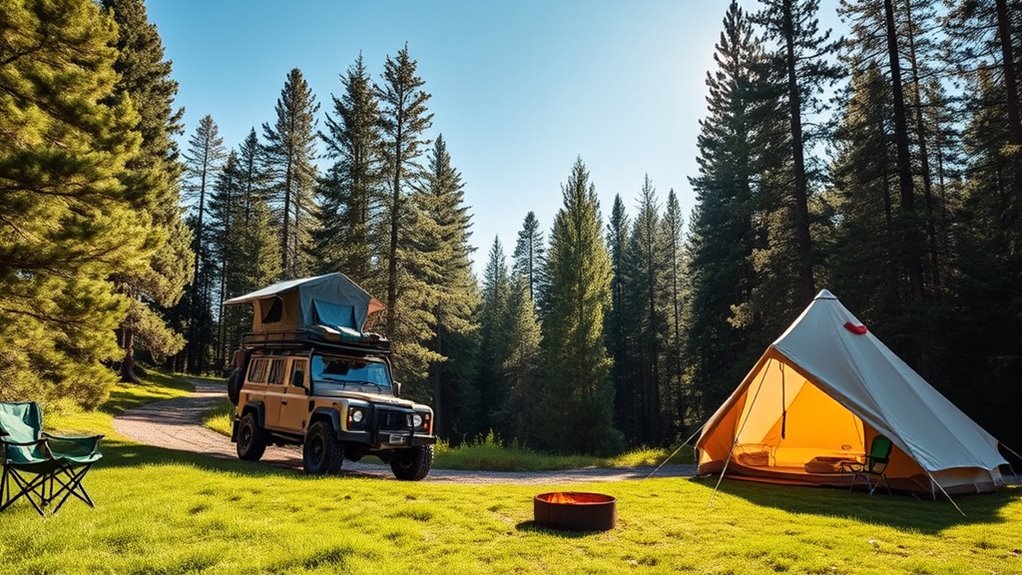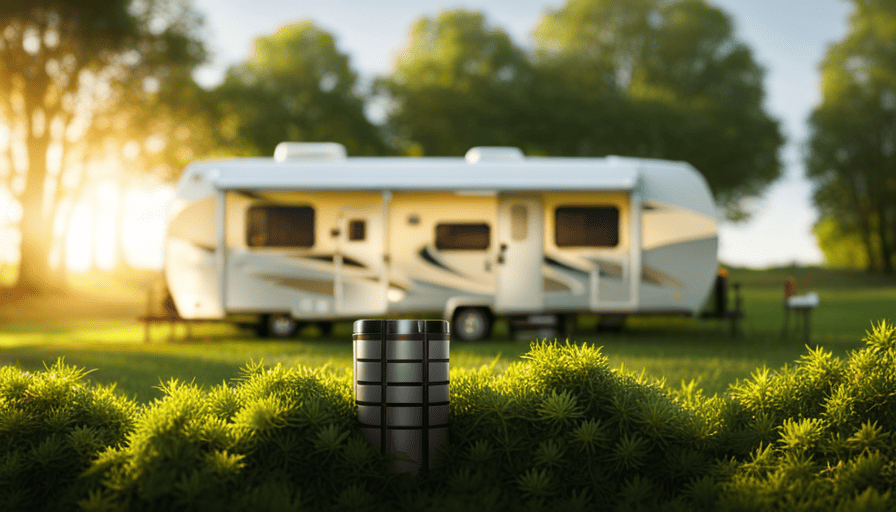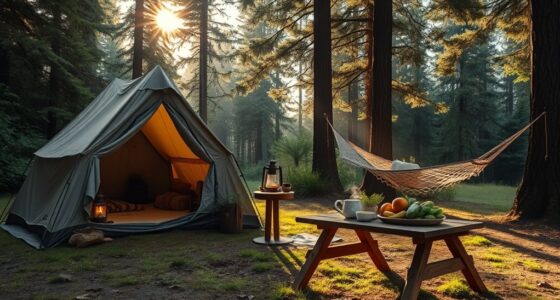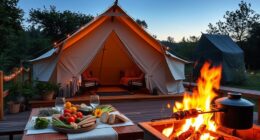If you prefer exploring rugged landscapes with the comfort of a mobile home, overlanding might be your ideal adventure, offering cozy amenities and vehicle-based flexibility. However, if you enjoy immersing yourself directly in nature through lightweight gear and challenging hikes, traditional camping suits your style. Consider whether you crave creature comforts or raw outdoor immersion—each approach offers unique rewards. To discover which adventure aligns with your personality and desires, explore the differences in more detail.
Key Takeaways
- Overlanding offers comfort and mobility with a customized vehicle, ideal for long, remote adventures; traditional camping emphasizes simplicity and minimal gear.
- Overlanding suits travelers who prefer home-like amenities and exploring rugged terrain by vehicle; traditional camping appeals to those seeking raw nature immersion.
- Overlanding involves vehicle-based exploration with specialized gear, while traditional camping relies on lightweight equipment and self-sufficiency.
- Choose overlanding if you want extended trips with comforts; opt for traditional camping if you enjoy physical challenge and minimalism.
- Both styles cater to different personalities: overlanding for comfort and convenience; camping for adventure and a closer connection to nature.

When it comes to exploring the great outdoors, overlanding and traditional camping offer two distinct but equally appealing experiences. If you’re drawn to the comfort and convenience of RV life, you might find overlanding an exciting way to combine adventure with home-like amenities. Overlanding involves traveling in a sturdy, often customized vehicle that allows you to venture deep into remote areas without sacrificing essentials like a bed, cooking facilities, or storage for gear. It’s perfect for those who want to extend their reach beyond typical campgrounds, exploring rugged trails or wilderness areas while still enjoying some creature comforts. This style of travel appeals to people who like the idea of setting up camp just about anywhere—whether that’s atop a mountain pass or beside a remote lake—without the hassle of pitching tents or hauling heavy backpacks.
Overlanding combines rugged vehicle travel with home-like comforts for remote adventures.
On the other hand, if your idea of adventure involves minimal gear and a focus on flexibility, backpacking trips might be more your speed. Backpacking demands lightweight gear and the willingness to carry everything on your back, which means you’re intimately connected with nature at all times. With this approach, you can access areas that are off-limits to larger vehicles, reaching pristine spots that are untouched and quiet. Backpacking emphasizes self-sufficiency and often involves charting trails, setting up simple tents, and cooking meals with portable stoves. It’s a more physically demanding form of camping, but it offers an unmatched sense of freedom and immersion in the landscape. If you prefer the idea of waking up to the sounds of birds, hiking through scenic routes, and experiencing nature firsthand, backpacking trips provide that raw, unfiltered connection.
Both styles cater to different personalities and preferences, but they share a common love of the outdoors. Overlanding is ideal if you want to explore long distances comfortably without leaving the vehicle, making it suitable for extended trips. It also complements the RV life, giving you a mobile home that can handle rough terrain while providing amenities like beds, kitchens, and sometimes even bathrooms. Conversely, backpacking is perfect if you seek simplicity and challenge, embracing minimalism and physical endurance as part of the journey. It’s about stripping down to essentials and discovering the landscape on your own terms. Additionally, understanding raw food preparation and nutrition can enhance your outdoor experience, whether in an overlanding setup or a backpacking adventure.
Ultimately, the choice between overlanding and traditional camping comes down to what excites you most—whether that’s the comfort of a well-equipped vehicle or the adventure of carrying everything you need on your back. Both options lead to unforgettable outdoor experiences, each offering its own unique way to connect with nature and satisfy your wanderlust.
Frequently Asked Questions
What Skills Are Necessary for Successful Overlanding Trips?
To succeed on overlanding trips, you need solid vehicle maintenance skills to handle breakdowns and repairs confidently. Navigation skills are equally essential, ensuring you stay on course and reach your destinations safely. Additionally, being resourceful, adaptable, and prepared for diverse terrains and weather conditions boosts your chances of a smooth adventure. With these skills, you’ll navigate challenging routes and enjoy the freedom and excitement overlanding offers.
How Do Costs Compare Between Overlanding and Traditional Camping?
They say “you get what you pay for,” and that’s true when comparing costs. Overlanding often involves higher expenses for vehicle maintenance and specialized gear, making it pricier upfront. Traditional camping is generally more budget-friendly, with lower gear expenses and minimal vehicle costs. However, overlanding’s investment can pay off in adventure quality. Consider your budget and how much you’re willing to spend on gear and vehicle upkeep to choose what fits best.
What Safety Precautions Should I Take for Remote Overlanding?
You should prioritize vehicle maintenance and emergency preparedness to stay safe during remote overlanding. Regularly check your vehicle’s systems, tires, and fluid levels before heading out, and carry essential tools and spare parts. Pack an extensive emergency kit with first aid supplies, navigation tools, and communication devices like a satellite phone. Stay informed about weather and terrain, and never venture alone—preparedness keeps you safe while exploring remote, rugged landscapes.
Can Beginners Easily Start With Overlanding or Traditional Camping?
You can absolutely start with either overlanding or traditional camping as a beginner. Imagine waking up to a sunrise in nature’s embrace—gear essentials like a reliable tent, sleeping bag, and navigation tools make it feasible. Proper trip planning, including route research and packing smart, guarantees a smooth experience. With enthusiasm and a little preparation, you’ll find these adventures accessible, rewarding, and perfect for creating unforgettable memories.
How Environmentally Friendly Are Overlanding Adventures Versus Camping?
Overlanding adventures tend to have a higher environmental impact if not managed responsibly, but you can minimize this with eco-friendly practices like Leave No Trace, proper waste disposal, and using sustainable gear. Traditional camping often leaves a smaller footprint when you stick to designated sites and follow local guidelines. Both can be eco-friendly options if you prioritize sustainability and respect nature, ensuring your adventures preserve the environment for future explorers.
Conclusion
Whether you’re drawn to the rugged thrill of overlanding or the cozy simplicity of traditional camping, your perfect adventure awaits just beyond the horizon. Imagine waking up to the gentle glow of sunrise filtering through your tent or steering your vehicle along winding mountain trails. Both experiences offer unique escapes—one fueling your spirit of exploration, the other offering peaceful reflection. Whichever path you choose, the wild landscape’s quiet invitation promises unforgettable memories, just waiting for you to answer.










